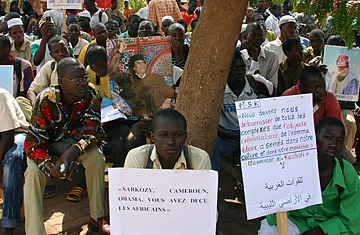
Supporters of toppled Libyan leader Muammar Gaddafi hold banners carrying anti-American and anti-European slogans written in French in Ouagadougou, Burkina Faso, on May 7, 2011
As dust swirled around the feet of the shopkeeper in Ouagadougou, so did rumors that Muammar Gaddafi, the toppled dictator of Libya, was making his way to the capital of impoverished Burkina Faso. The merchant, Ouedraougo Ahmed, 31, could only look on quizzically at the stories. Why would Gaddafi come here? He pointed to the paltry stock of his shop — plastic bags, a few rounds of rubber tape. The shack next door offered slightly more colorful merchandise: Arabic books and prayer mats. The economy hasn't been good, with predictable results on public order. Inflation led to violent protests in the streets of Ouagadougou in April. And that was after soldiers mutinied in February over the government's failure to pay their wages. Along with neighboring Niger and Mali, the country has also become a main recruiting ground for al-Qaeda in the Islamic Maghreb, a group Gaddafi has always detested. What, then, could possibly attract the Colonel to poor, landlocked Burkina Faso?
First, he was invited. Sort of. On Aug. 25, the government of Burkina Faso joined Niger and Algeria (where some Gaddafi kin have found refuge) in offering the Libyan dictator and his family political asylum. President Blaise Compaoré happens to be a political acolyte of Gaddafi, having received seminal training in the art of politics in Libya in the early 1980s. Compaoré may have put some of those lessons to use in 1987 when he overthrew the government of his erstwhile ally Thomas Sankara. Ahmed, the shopkeeper, is welcoming; he hopes Gaddafi will indeed show up. "It's good if he comes, because if he does, the international community will come here," Ahmed says. He sees the fallen Libyan as a magnet for wealth. Indeed, there were corollary rumors of military convoys carrying gold with the supposedly fleeing Gaddafis.
Barak Barfi, a fellow with the New America Foundation currently in Tripoli, says Gaddafi would be "eagerly welcomed" by the Burkinabé or Nigerien governments and their people. Borders between the Sahel countries are porous, and with jobs scarce, for years many out-of-work laborers have migrated from the Sahel north into Libya. "He has showered countries such as Mali and Niger with aid the last two decades and welcomed guest workers from these countries and been a voice against Western domination of the region — a policy that resonates with people who had a bitter experience with colonialism," he says. "The fact that he was overthrown by NATO bombs only further ingratiates him with African states."
On the streets of Ouagadougou on Tuesday, Sept. 6, however, a largely uneducated population seems mostly unaware of the rumors surrounding a Gaddafi arrival. Clusters of young men idly sitting in the streets draw blanks when asked about Gaddafi. A man selling cheap footwear on the sidewalk says he isn't sure who the dictator is — but hopes that if he does visit, he will buy a pair of shoes. Young women working at a foreign-exchange office next to the German embassy say they have heard rumors that Gaddafi's sons, but not Muammar himself, would be seeking asylum — and that the news wouldn't affect their daily lives either way. Yousef Konate, 34, says his friends aren't paying attention to the situation, focusing instead on keeping their jobs. That indifference could provide the safe harbor Gaddafi needs. "If you are not informed," says Konate, "how can you refuse him?"
Like many others here, Konate works two jobs to make ends meet: he's a hotel receptionist as well as a commercial agent for a local solar-energy firm. He's quite aware of who Gaddafi is and is less sanguine about the Colonel taking up residence in Ouagadougou. "Our government says it is free to bring Gaddafi here, not as the chief of Libya but as [an ordinary man], and he has that right," he says. "I don't want to see him killed. I think that he has to be brought to justice — he has to answer to his own acts. If he's here, the government has to then give him back to Libya to face justice."
But is he actually heading to Ouagadougou? The hunt for Gaddafi now spans practically half of the African continent, from Sirte, his hometown, and other remaining loyalist strongholds in Libya, down into Niger, where his security director has reportedly been sighted, and now Burkina (which until 1984 was known as the Republic of Upper Volta; its current name means "Land of the Upright People"). A visit from Gaddafi would focus global attention on one of Africa's poorest nations, one with a population of fewer than 16 million. But there's another complication: Burkina joined Niger and Togo last week in recognizing the National Transitional Council, the umbrella organization formed by the leaders of the rebellion against the Colonel, as the legitimate government of Libya. Says Konate: "I think he won't come here because he's so proud."
